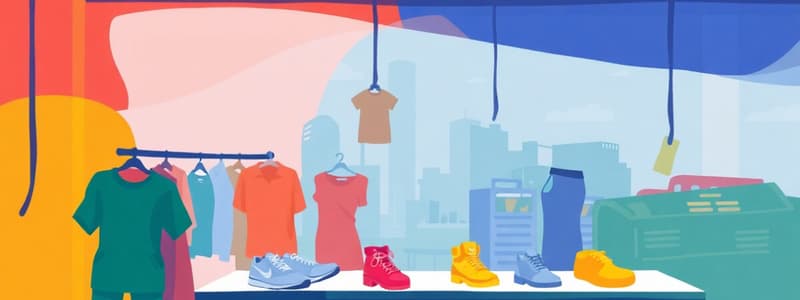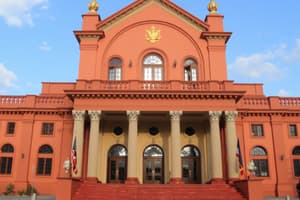Podcast
Questions and Answers
What has primarily driven the demand in the Philippines apparel and footwear industry?
What has primarily driven the demand in the Philippines apparel and footwear industry?
- Government subsidies for retailers
- The presence of natural fibers
- Demand for local and international branded products (correct)
- Local manufacturing capabilities
Which segment has not been mentioned as part of the Philippines apparel and footwear market?
Which segment has not been mentioned as part of the Philippines apparel and footwear market?
- Men's wear
- Women's wear
- Luxury wear (correct)
- Children's wear
What has significantly influenced the manufacturing sector in the Philippines apparel industry?
What has significantly influenced the manufacturing sector in the Philippines apparel industry?
- Subcontracting to local brands
- High demand for labor
- Unregulated market conditions
- Costly local labor (correct)
Which countries have been identified as having higher demand for Philippine apparel exports?
Which countries have been identified as having higher demand for Philippine apparel exports?
What major trend was observed in the Philippines apparel market from 2009 to 2014?
What major trend was observed in the Philippines apparel market from 2009 to 2014?
What primary factors contributed to the growth of the indigenous textile and clothing industry?
What primary factors contributed to the growth of the indigenous textile and clothing industry?
Which apparel category is least likely to be a focus for retailers in the Philippines according to the report?
Which apparel category is least likely to be a focus for retailers in the Philippines according to the report?
How did personal disposable income affect the apparel market in the Philippines from 2009 to 2014?
How did personal disposable income affect the apparel market in the Philippines from 2009 to 2014?
What has been a significant issue faced by domestic companies in the Philippines regarding leather production?
What has been a significant issue faced by domestic companies in the Philippines regarding leather production?
What role do the Philippine Footwear Federation and Sigla ni Kapitan Moy play in the footwear industry?
What role do the Philippine Footwear Federation and Sigla ni Kapitan Moy play in the footwear industry?
What trend has been observed in consumer purchasing habits in the Philippines regarding footwear?
What trend has been observed in consumer purchasing habits in the Philippines regarding footwear?
How has the growing young population in the Philippines influenced retail shopping?
How has the growing young population in the Philippines influenced retail shopping?
What impact has the SAVE Act had on the Philippines textile industry?
What impact has the SAVE Act had on the Philippines textile industry?
During 2010-2012, how did the sales growth of hypermarkets and supermarkets in the Philippines compare to small-scale domestic retailers?
During 2010-2012, how did the sales growth of hypermarkets and supermarkets in the Philippines compare to small-scale domestic retailers?
What has primarily driven the customer sentiment upward in the Philippines, encouraging foreign enterprises to enter the market?
What has primarily driven the customer sentiment upward in the Philippines, encouraging foreign enterprises to enter the market?
What has contributed to the sustained growth of the footwear market in the Philippines from 2009-2014?
What has contributed to the sustained growth of the footwear market in the Philippines from 2009-2014?
What has been a major contributing factor to the diversification of the retailing process in the apparel sector?
What has been a major contributing factor to the diversification of the retailing process in the apparel sector?
Which demographic group was responsible for a major proportion of apparel sales in the Philippines in 2014?
Which demographic group was responsible for a major proportion of apparel sales in the Philippines in 2014?
What trend has been observed in the Filipino apparel market due to the onset of international companies?
What trend has been observed in the Filipino apparel market due to the onset of international companies?
During which months do Filipino consumers traditionally purchase apparel the most?
During which months do Filipino consumers traditionally purchase apparel the most?
Which factor contributed to the higher demand for school clothes in the Philippines?
Which factor contributed to the higher demand for school clothes in the Philippines?
What was the general trend in purchase behavior for apparel products in the Philippines from 2009 to 2014?
What was the general trend in purchase behavior for apparel products in the Philippines from 2009 to 2014?
What type of materials have been introduced in the newly manufactured apparel in the Philippines?
What type of materials have been introduced in the newly manufactured apparel in the Philippines?
How did men's apparel purchases compare to women's apparel purchases in the Philippines?
How did men's apparel purchases compare to women's apparel purchases in the Philippines?
Study Notes
Philippines Apparel and Footwear Industry Overview
- The Philippines apparel and footwear industry is driven by demand for both local and international brands.
- The country's garment industry is the second largest export industry, primarily through subcontracting operations for international brands.
- Local manufacturing faces challenges with high labor costs, leading to a significant import of apparel from other countries like Thailand and Hong Kong.
- The market is dominated by local players like Bench and Penshoppe, alongside international brands such as Uniqlo, H&M, Nike, and Marks and Spencer.
Product Categories
- The market encompasses menswear, women's wear, and children's wear, including:
- Formal wear
- Casual wear
- Active wear
- Other categories
Local Manufacturing and Import
- Local manufacturers primarily produce apparel for export to international markets, particularly the USA and Japan.
- Import plays a crucial role in the domestic market, driven by demand for foreign brands with high brand image.
- The apparel market has grown steadily with a CAGR of around ~% between 2009 and 2014.
Indigenous Textiles and Clothing
- Due to the abundance of natural fibers like abaca, pina, silk, and ramie, the indigenous textile and clothing industry is thriving.
- Growing disposable income and a fashion-conscious urban youth have increased per capita apparel expenditure in the Philippines, rising from USD ~ in 2009 to USD ~ in 2014.
Footwear Market
- Footwear production in the Philippines involves predominantly manual and semi-mechanized processes.
- Local companies largely use leather as the primary raw material, but low-quality domestic leather leads to imported leather, adding to production costs.
- The footwear market has expanded at a CAGR of ~% from 2009 to 2014, reaching USD ~ million in revenue by 2014.
International Brands and Retail
- Customers favor international brands over local products.
- Brands like Nike, Adidas, and Puma, catering to both casual wear and sportswear, have contributed to the popularity of high-value international products at affordable prices.
- Global brands recognize the growing Philippines market for apparel and footwear, driven by economic expansion and consumer sentiment.
- Store specialists have introduced these brands to cater to Filipinos' evolving shopping preferences, fueled by increased purchasing power and a shift towards branded goods in modern retail chains.
- The growing young population prioritizes convenience and one-stop shops, contributing to the success of hypermarkets and supermarkets, which have experienced CAGRs of ~% and ~% respectively during 2010-2012.
Philippines Textile Industry and Distribution
- The Philippines textile industry predominantly focuses on exports to the USA, capitalizing on the SAVE Act, which eliminates duties on apparel products, expanding textile trade between the two countries.
- Distribution channels are traditionally dominated by small-scale retailers, but hypermarkets and supermarkets have diversified the retail landscape.
Global Apparel Companies and Sales Trends
- The arrival of international apparel companies like H&M has significantly impacted the Philippines market, with local customers showing a preference for international brands and competitive pricing.
- Demand for diverse apparel products is consistently growing.
- In 2014, the majority of apparel sales were for women's apparel, accounting for ~% of total apparel sales.
- Women purchased apparel worth USD ~ million in 2014, while men's apparel purchases accounted for USD ~ million, representing ~% of the market share.
- Total apparel sales to individuals over 14 years old reached USD ~ million in 2014.
- School children, part of the population under 14, generate a higher demand for clothing compared to older populations.
- Traditionally, Filipino consumers make the majority of their apparel purchases during May, November, and December, coinciding with the Yuletide season, school openings, and the introduction of new apparel made from local fibers like abaca and ramie.
Studying That Suits You
Use AI to generate personalized quizzes and flashcards to suit your learning preferences.
Related Documents
Description
Explore the dynamics of the Philippines apparel and footwear industry, examining key players, market categories, and the impact of imports and local manufacturing. This quiz covers the industry's export significance and challenges faced by local manufacturers. Test your knowledge on both local and international brands and their market influence.




